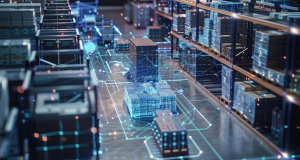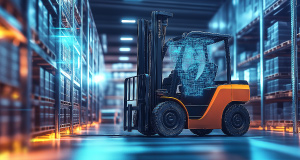Welcome to another episode of Tech Lyceum. I'm very excited to be back. My name is Neerja, and today we are going to be exploring a very interesting topic and something that may be on some of your minds, why is supply chain digitalization the key to greater efficiency and resilience? It's great to get some insights from two eminent speakers on the show today. First up, we've got Yogesh Trivedi, Associate Vice President manufacturing. Let me tell you a little bit about Yogesh. He has 24 years of experience with 21 years in sales roles, including account management, business development as well. He has worked across the US, Canada, Switzerland, Ireland, Hungary and India, serving domains like retail and CPG healthcare, life sciences and manufacturing. Yogesh has successfully opened and managed several Fortune 500 accounts. Yogesh, it's great to have someone like you, you know, give us insights today. Thank you for joining us.

Thank you, Neerja, for the introduction.
We've also got Pradip Das, senior practice director and SME supply train. Pradip, with an impressive background spanning 24 years, boasts extensive experience across a range of industries including automotive, oil and gas, consumer packaged goods, durable goods and logistics services. His expertise lies in sales forecasting, production planning, scheduling and inventory management. Let me tell you, Pradip has held leadership roles within Birlasoft Supply Chain consulting team where he has been instrumental in providing innovative insights and thought leadership to enhance supply chain capabilities. And it's great to know he's bringing that to the show today as well. Pradip, thank you for joining us.
Thanks. Neerja, excited to be here.
Well, we're excited to dive straight in and Yogesh, let me direct this first question to you on the subject from your perspective in sales, right?
Q: How is the market reacting to the increasing digitalization of supply chains, and what trends are you observing specifically in customer expectations and purchasing behaviors as a result?
Fantastic. Now, techie at the heart during the weekdays, you are almost in your adulthood, if I may say, 18th year of working in Microsoft. And I can tell you the you've seen, you know, early coding days to cloud to now the transformative Gen AI, it can become very, very hectic. I know that. And who did mention that's upon your weekend. So let's dive into weekends here.
Q: I really want to know, as a technologist, how do you unwind? What are your hobbies? You did mention your farming part. But my listeners would definitely like to know more
Good, So thank you, Neerja once again for having me here on this podcast, and it's a great, great question. So if you see the market is responding positively to the increasing digitalization of supply chains, from a sales perspective, the shift is driving several key trends in customer expectations and purchasing behaviors. We'll quickly see some of that. So if you see today, customers are now expecting greater transparency and real time visibility to their orders. They want to track their shipments at every stage, which has led to a demand for advanced tracking systems and predictive analytics. The next one, I would say, is growing emphasis on speed and efficiency. Customers are now expecting faster delivery times and more reliable service, which is pushing all the companies to optimize their supply chain operations through automation and AI driven solutions. Sustainability is another factor which is gaining lot of importance now. Customers are increasingly getting conscious of the environmental impact of their purchases and prefer companies that demonstrate sustainable practices within their supply chains. Personalization, too, is becoming very important clients are expecting today, tailored experiences and solutions that meet their specific needs, which is once again driving the adoption of more flexible and responsive supply chain technologies. Overall, I can say that the digitalization of supply chains is reshaping client expectations, making transparency, speed, sustainability and personalization critical components of successful sales strategies.
Yeah, thank you for covering all of that. Yogesh. And Pradip, let me now shift focus to this question.
Q: As a supply chain subject matter expert, can you elaborate on how digitalization is enhancing supply chain resilience and efficiency? And could you also touch upon what key innovations are driving these improvements?
Sure, absolutely. And thanks Yogesh for setting up that context. So you heard Yogesh seeing all the customers expectations in terms of, you know, transparency, updates, resiliency, so that's what leading to this digitization of the supply chain. And as you know, many of our Birlasoft clients are running massive companies, global companies, with complex supply chains and operating offers such an complex supply chain in today's dynamic economy is truly challenging. Demand and supply pictures changes dynamically. There are lot of disruptions from, you know, minor delays to where we have heard about LA's port congestions, the supply chain managers have to manage these disruptions daily, weekly and monthly. And in this scenario, digitalization of the supply chain becomes a true and extremely important tool kit and a game changer for such Supply Chain Leaders. And I'll give you some of the tool kits that are truly coming out, innovations that are truly coming out right now. Start with IOT and data analytics that allows the supply chain planners to keep an eagle eye on every part of the supply chain in real time. And you heard from Yogesh. You know, customers are expecting such real time updates and transparency. These tools allows like a crystal ball for them to foresee and fix issues before they blow up. ChatGPT is very well known now, so this whole Gen AI and machine learning, it's like taking over the mundane task and enhancing organizations decision making and speed and accuracy. Blockchain ensures every such transaction is transparent, secure, and no more such shady and back end dealing. Finally, in manufacturing we've got digital twins, which is kind of a, you know, a visual replica of your physical assets. This helps us organization, to plan and test scenarios without any real world risks. It integrates a digital tool in a production processes, scheduling processes, making everything smarter and more efficient. And with these tools, I can say that transforming supply chain to be more Agilent, resilient and efficient more than ever, makes it truly, truly a digital.
Thanks, Pradip. Now that you've you know, listed out these ways in which it is enhancing efficiency. Yogesh, if I can bring you in here and ask you,
Q: How do you see the competitive landscape evolving with the adoption of supply chain digitalization, and what strategies are companies using to say, differentiate themselves in this increasingly digital market?
So Neerja if you see today, supply chain digitalization has definitely proven to be a key differentiation factor, as Pradeep mentioned, some of the technology areas and some of the domain areas, right? So let me add some color to it, and let me give you some examples. So with amalgamation of AI, ml, IOT, Blockchain, data analytics, cloud computing companies are strategically positioning themselves to improve customer experience and thus increase their market share. Some examples of how companies have done I would quickly quote. So if you see Proctor and Gamble, they have created a more resilient supply chain by building collaborative ecosystems, building partnerships and collaborative network with suppliers distributors to share data and resources, this has helped Procter and Gamble to improve supply chain efficiency and innovation. Walmart is using Blockchain to track the origin of its produce and trace during the relevant life cycle to ensure food safety and quality. DHL, on the other hand, is using AI predictive analytics to predict the shipment delays and reroute packages to optimize logistic and the last one but, but obviously the most you know important, Amazon, if you see through increased automation methodologies and robots, they have streamlined order fulfillment in its warehouses. So these are the examples which you know, where we have seen how companies are adopting this, Neerja.
Excellent. And finally, to you, Pradip, I will ask this,
Q: What are the biggest challenges organizations face when implementing supply chain digitalization, and what are some ways in which they can overcome these obstacles to achieve greater efficiency and resilience?
Sure Neerja, and this is something daily life. Most of our clients are going through their digitalization journey, and we work hand in hand with them. And some of the real hurdles organization these organization face includes, first of all, an organizational change management. You know, resistance, resistance to change can be a big, big hurdle. People often get comfortable with the way things are and be skeptical about you this using this new technologies. So we have put together a methodology of clear communication, solid training program to get to know the benefits and feels confident of using these tools. The second big challenge that we typically face are integration of this disparate system. So if you see, a lot of our clients have grown inorganically through acquisitions, and they will have lot of disparate ERP systems, even old legacy systems, they are not easy to connect and integrate with this is the same item could be ABC in one system and 123, in another system. So we are working with them to invest in a scalable and modular technologies. And we have also developed a dashboard, inventory dashboard tool, B, supply, connect, to help them get over through this visibility, The third big challenge that we are seeing and work while working with the customers is data fragmentation. When data is scattered across multiple system, it's like trying to piece together a jigsaw puzzle with missing pieces. We have been focusing on having this customer, unifying the data sources, clean it up, do a data fragmentation with the supply chain, we have our own data as a service, offering to help clients overcome this challenge. Digitalization journey is not a not a small or cheap thing, it's the expenses of implementing such a solution could be daunting, and we are working in partnership with such tech providers to phase out such an approach can which can help spread out the cost and make it more manageable. Lastly, any regulatory hurdles can also slow things down. As you heard, there is a green mandate and there is a Paris pod and countries go in and out. So we need to often plan ahead and collaborate with regulatory bodies to ensure compliance.
In short, while these challenges are significant, they are not insurmountable.
Absolutely. Thank you Pradip, thank you Yogesh, for shining light on the subject. And before we wrap up, I'd love for you to leave the listeners with a few takeaways from the discussion that we've had. Yogesh, why don't you start off.
Perfect. Thank you, Neerja, so I would say that digitalization and supply chain is a must today. I mean, it's not an option for sure. Customers are definitely expecting lot from the companies. And I would say that, I mean, the companies are definitely investing lot of time energy into these areas and improving the customer experience. So digitalization, I mean, you know, you will see that with coming months and coming years, the importance is going to grow a lot.
Thank you.Yogesh and Pradip, your parting words.
Sure. Digital supply chain, it's not just a technology, it's human and technology together, and by addressing them strategically, companies can really, truly unlock the full potential of their own digital supply chains.
Pradip, Yogesh, thank you so much for joining us once again and sharing your insights on this. It was great speaking with you both.
Thanks, Neerja.
Thank you.
That's a wrap on this episode of Tech Lyceum. Join us again as we uncover the best from the world of tech until next time it's me Neerja signing off. Bye.




